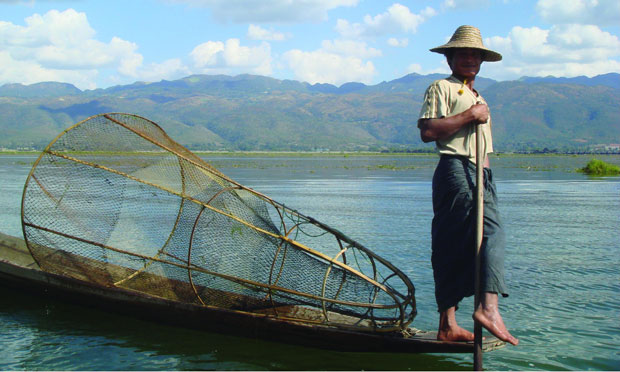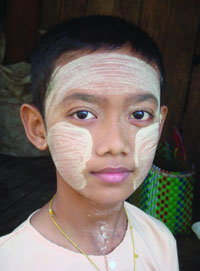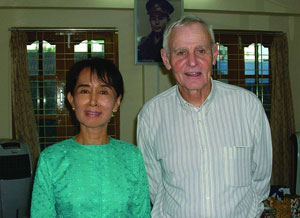Professor's film chronicles life in Myanmar
Professor's film chronicles life in Myanmar
Perhaps Robert Lieberman's next documentary will be about North Korea. The Cornell physics professor, novelist, and filmmaker suggests the topic only half in jest; after all, he notes, his latest movie is about the world's second-most-isolated country. They Call it Myanmar: Lifting the Curtain has garnered kudos from critics and played to sold-out houses since its debut in 2011; it comes out on home DVD, iTunes, and video-on-demand in November. "I don't think any other film has put a human face on the country," says Lieberman '62, MS '65. "I want to show you what the people look like, how they eat, how they sleep."

Shot more or less on the sly over five trips—some made under the aegis of teaching filmmaking or consulting on anti-tuberculosis PR campaigns—the documentary explores both the country's political history and its people's daily lives. Formerly known as Burma, Myanmar is a nation of 60 million whose immediate neighbors include India and China. (Can you locate it on a map? As Lieberman notes in the film, most of us can't.) Plagued by widespread poverty despite a wealth of resources—including gems, oil, and natural gas—it won independence from Britain in 1948 only to suffer through decades of brutal military dictatorship. The most famous face of its opposition is politician and activist Aung San Suu Kyi, who lived under house arrest for fifteen years before being released in 2010. As Lieberman and his colleagues were finishing the film—working to edit more than 120 hours of footage into some ninety minutes—he landed an interview with her; though she put a ban on "personal" questions, he was able to elicit some candid comments about her memories of her father, a leader of the colonial independence movement who was assassinated when she was just two years old.

The film (which was co-produced by Deborah Hoard, MPS '78) chronicles such issues as how Buddhism shapes the nation's character, the vast gulf between the haves and have-nots—there's footage, provided by an outside source, of the lavish wedding of a general's daughter—and the deficits of an education system that offers most children only minimal schooling. In one wrenching scene, Lieberman highlights the nation's dismal medical care with the case of a young girl suffering from ulcerative TB whose family can't afford $5 worth of medicine to treat her; in another, he describes how some in Myanmar are so poor that they routinely pawn their bedding, mosquito nets, and cookware each morning for bus fare to work, then redeem them at night. "I've been all over the world," Lieberman says, "and next to Ethiopia, I've never seen such a poor country."
But Lieberman also showcases the fundamentally sunny and resilient nature of the Burmese people; as critic Roger Ebert wrote, "I've never seen a documentary with more smiling faces." The film—which, to Lieberman's chagrin, is ineligible for Oscar consideration because it aired on European TV before its first theatrical showing—has received generally positive reviews; Ebert called it "a thing of beauty" and gave it three stars. "Its cinematography, music, and contemplative words make it not an angry documentary," he wrote, "but more a hymn to a land that has grown out of the oldest cultures in Asia." Suu Kyi's release and subsequent election to her nation's parliament made the film particularly timely, giving it a PR boost; it has had limited runs in theaters and been shown at festivals around the world, including sold-out screenings at Lincoln Center in April and September. "I don't look at this as journalism," Lieberman says. "I'm not a journalist, and I make no pretenses. It's a novelist's-eye view of Burma. You see the country through my eyes."

Other than Lieberman—who narrates and sometimes appears on camera—Suu Kyi is the closest thing to a protagonist in the film, whose subjects mostly remain anonymous for fear of governmental retribution. "You don't want to wake up at one o'clock in the morning and worry about who's in jail because of you," muses Lieberman, who shot most of the film himself with a $1,200 Sony high-definition digital camera. "It was intended as a non-political film—but the politics crept in, because you couldn't avoid them." Soldiers or police occasionally told Lieberman to stop filming, but he says he never felt threatened—though he did take the precaution of asking friends to carry thumb drives with back-up copies of his footage in case his laptop was confiscated at the border. On his first trip, around Christmas 2008, he even had his wife wrap his gear in holiday paper to throw off inquisitive customs officers. "I had microphones and things," he says, "and I figured if they opened it up I'd tell them it was karaoke equipment and start singing."


